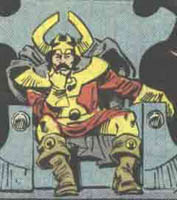


Is referred to rather than recounted at length. Unlike the Prose Edda, in the Poetic Edda the tale of Baldr's death One of the two Merseburg Incantations names Baldere, but also mentions a figure named Phol, considered to be a byname for Baldr (as in Scandinavian Falr, Fjalarr (in Saxo) Balderus : Fjallerus). Meaning "shining one, white one, a god" derived from the meaning ofīaltic baltas, further adducing Slavic Belobog and German Berhta.

This, as Grimm points out, would agree with the In continental Saxon and Anglo-Saxon tradition, the son of Woden is called not Bealdor but Baldag (Saxon) and Bældæg, Beldeg (Anglo-Saxon), which shows association with "day", possibly with Day Old Norse also shows the usage of the word as an honorific in a few cases, as in baldur î brynju (Sæm. Philologist Rudolf Simelk argues that the original meaning of Bældæg must be understood as 'shining day'. According to linguist Vladimir Orel, this could be linguistically tenable. This etymology was originally proposed by Jacob Grimm (1835), who also speculated on a comparison with the Lithuanian báltas ('white', also the name of a light-god) based on the semantic development from 'white' to 'shining' or 'strong'. Old Norse ballr 'hard, stubborn', Gothic balþa* 'bold, frank', Old English beald 'bold, brave, confident', Old Saxon bald 'valiant, bold', Old High German bald 'brave, courageous'). Old Norse mann-baldr 'great man', Old English bealdor 'prince, hero'), itself a derivative of *balþaz, meaning 'brave' (cf. The Old Norse theonym Baldr ('brave, defiant' 'lord, prince') and its various Germanic cognates – including Old English Bældæg and Old High German Balder (or Palter) – probably stems from Proto-Germanic *Balðraz ('Hero, Prince' cf.

Baldr had the greatest ship ever built, Hringhorni, and there is no place more beautiful than his hall, Breidablik. Compiled in Iceland during the 13th century, but based on older Old Norse poetry, the Poetic Edda and the Prose Edda contain numerous references to the death of Baldr as both a great tragedy to the Æsir and a harbinger of Ragnarök.Īccording to Gylfaginning, a book of Snorri Sturluson's Prose Edda, Baldr's wife is Nanna and their son is Forseti. In wider Germanic mythology, the god was known in Old English as Bældæg, and in Old High German as Balder, all ultimately stemming from the Proto-Germanic theonym * Balðraz ('Hero', or 'Prince').ĭuring the 12th century, Danish accounts by Saxo Grammaticus and other Danish Latin chroniclers recorded a euhemerized account of his story. In Norse mythology, Baldr is a son of the god Odin and the goddess Frigg, and has numerous brothers, such as Thor and Váli. Baldr (also Balder, Baldur) is a god in Germanic mythology.


 0 kommentar(er)
0 kommentar(er)
